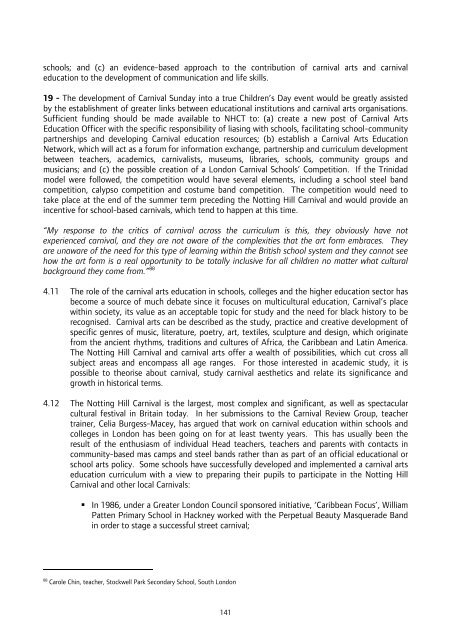Notting Hill Carnival Strategic Review - Intelligent Space
Notting Hill Carnival Strategic Review - Intelligent Space
Notting Hill Carnival Strategic Review - Intelligent Space
Create successful ePaper yourself
Turn your PDF publications into a flip-book with our unique Google optimized e-Paper software.
schools; and (c) an evidence-based approach to the contribution of carnival arts and carnival<br />
education to the development of communication and life skills.<br />
19 - The development of <strong>Carnival</strong> Sunday into a true Children’s Day event would be greatly assisted<br />
by the establishment of greater links between educational institutions and carnival arts organisations.<br />
Sufficient funding should be made available to NHCT to: (a) create a new post of <strong>Carnival</strong> Arts<br />
Education Officer with the specific responsibility of liasing with schools, facilitating school-community<br />
partnerships and developing <strong>Carnival</strong> education resources; (b) establish a <strong>Carnival</strong> Arts Education<br />
Network, which will act as a forum for information exchange, partnership and curriculum development<br />
between teachers, academics, carnivalists, museums, libraries, schools, community groups and<br />
musicians; and (c) the possible creation of a London <strong>Carnival</strong> Schools’ Competition. If the Trinidad<br />
model were followed, the competition would have several elements, including a school steel band<br />
competition, calypso competition and costume band competition. The competition would need to<br />
take place at the end of the summer term preceding the <strong>Notting</strong> <strong>Hill</strong> <strong>Carnival</strong> and would provide an<br />
incentive for school-based carnivals, which tend to happen at this time.<br />
“My response to the critics of carnival across the curriculum is this, they obviously have not<br />
experienced carnival, and they are not aware of the complexities that the art form embraces. They<br />
are unaware of the need for this type of learning within the British school system and they cannot see<br />
how the art form is a real opportunity to be totally inclusive for all children no matter what cultural<br />
background they come from.” 88<br />
4.11 The role of the carnival arts education in schools, colleges and the higher education sector has<br />
become a source of much debate since it focuses on multicultural education, <strong>Carnival</strong>’s place<br />
within society, its value as an acceptable topic for study and the need for black history to be<br />
recognised. <strong>Carnival</strong> arts can be described as the study, practice and creative development of<br />
specific genres of music, literature, poetry, art, textiles, sculpture and design, which originate<br />
from the ancient rhythms, traditions and cultures of Africa, the Caribbean and Latin America.<br />
The <strong>Notting</strong> <strong>Hill</strong> <strong>Carnival</strong> and carnival arts offer a wealth of possibilities, which cut cross all<br />
subject areas and encompass all age ranges. For those interested in academic study, it is<br />
possible to theorise about carnival, study carnival aesthetics and relate its significance and<br />
growth in historical terms.<br />
4.12 The <strong>Notting</strong> <strong>Hill</strong> <strong>Carnival</strong> is the largest, most complex and significant, as well as spectacular<br />
cultural festival in Britain today. In her submissions to the <strong>Carnival</strong> <strong>Review</strong> Group, teacher<br />
trainer, Celia Burgess-Macey, has argued that work on carnival education within schools and<br />
colleges in London has been going on for at least twenty years. This has usually been the<br />
result of the enthusiasm of individual Head teachers, teachers and parents with contacts in<br />
community-based mas camps and steel bands rather than as part of an official educational or<br />
school arts policy. Some schools have successfully developed and implemented a carnival arts<br />
education curriculum with a view to preparing their pupils to participate in the <strong>Notting</strong> <strong>Hill</strong><br />
<strong>Carnival</strong> and other local <strong>Carnival</strong>s:<br />
• In 1986, under a Greater London Council sponsored initiative, ‘Caribbean Focus’, William<br />
Patten Primary School in Hackney worked with the Perpetual Beauty Masquerade Band<br />
in order to stage a successful street carnival;<br />
88<br />
Carole Chin, teacher, Stockwell Park Secondary School, South London<br />
141








